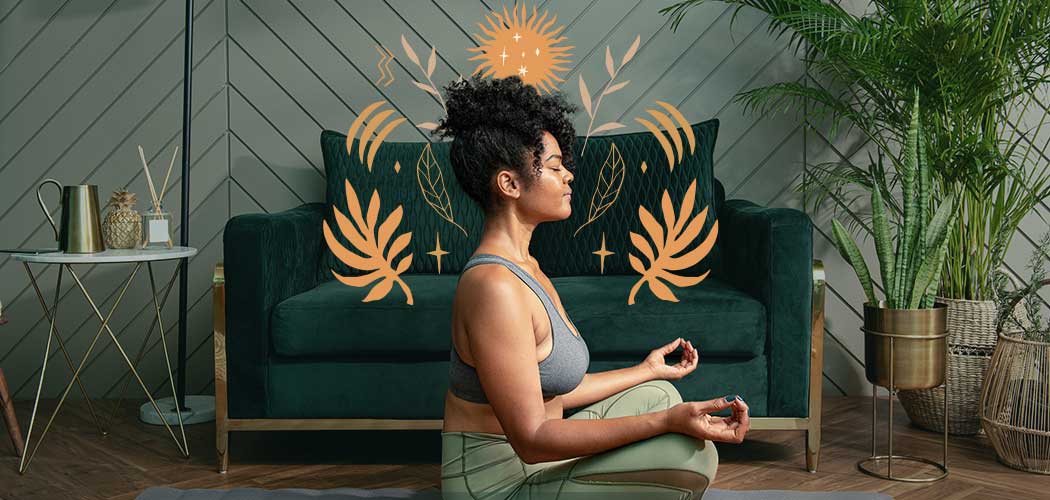Much like dishes in the sink, anxiety and stress can begin to pile up when left unattended. For a lot of us the day is just too jammed packed to remember to focus on mental well-being — whether it’s keeping the kids in check, responding to emails, keeping up around the house, or even work Zoom meetings, before we know it we look at the clock and it’s time for bed.
Before succumbing to stress and anxiety, we can show you how daily meditation, for even a few minutes, can reduce stress, relieve anxiety, and help you be the best version of yourself from sun-up to sun-down.
The Idea Behind Meditation
The word meditation comes from the Latin term “meditatum”, which means “to ponder,” and it’s been practiced for centuries by people across the globe for a multitude of reasons.
The goal of meditation is to quiet your mind and focus, but that shouldn’t be confused with an absence of thought, according to meditation expert Kimberly Carson.
“Thoughts will never permanently stop happening,” says Carson. “There may be moments when you’re in a thought-free zone, but that’s not the ultimate goal.”
Instead, the true aim of mediation is to be fully present in the moment, and to learn to harness the energy you have in order to produce the most effective version of yourself on a daily basis. In line with focusing energy, meditation also aims to slow down the racing thoughts running through your mind, and as Deepak Chopra says, “[make] the overactive mind quiet.”
Basics of Meditation
The great thing about meditation is that there isn’t a right or wrong way to go about it, and the way that works best for you may not work for your friend. The key though across the board is to relax — and we know that’s a lot easier said than done!
Here are the seven steps to meditate effectively according to Mindful.org:
- Find a calm and quiet(ish) place to sit
- Set a time limit on your phone — maybe 5 minutes to start
- However you choose to sit, make sure you’re stable (you don’t need special equipment, pick a chair or a towel or yoga mat — whichever works best for you)
- Focus on breathing in and out, and close your eyes (only if you want!)
- Notice when your mind wanders, and slowly bring it back to your breath and your present
- Don’t obsess over thoughts, stay in the moment and bring your mind back when needed
- When the timer ends, ease up and out of your meditative state
The key takeaway from each of the seven tips is don’t judge yourself or your mind! Remain calm and allow your mind to go where it wants, just remember to slow it down and guide it back to your breathing when you can.
Starting out, you may only be able to commit to meditating a day or two a week, and that’s fine. Fitting meditation into your daily habits starts with dedicating time during the day to focus on YOU, and to allow yourself to drift from all the craziness in the outside world just for a few minutes.
Benefits of Meditation
Meditation is a form of self care that can help reduce stress. While that is undoubtedly true, it also has a number of additional health and productivity benefits.
Two key areas that meditation has been shown to have positive effects is reducing both anxiety and stress.
Chopra cites a report published in the “Psychological Bulletin” which combined the findings of 163 separate studies, “The overall conclusion was that practicing mindfulness or meditation produced beneficial results, with a substantial improvement in areas like negative personality traits, anxiety, and stress.”
Additionally, researchers at Oxford University in England found that mindfulness meditation, or slowing down racing thoughts and letting go of negativity, has a profound effect on reducing anxiety. They found that meditating for just 20 minutes reduced anxiety by as much as 22%. Over time and with practice, meditation also seemed to positively alter the brain in the regions associated with “me-centered” thoughts. Meaning that people were not only coping with their anxiety, but beginning to recover from it.
Going beyond reducing stress and anxiety, meditation has also been shown to produce many other positive outcomes, including:
- Improved memory
- Increased imagination and creativity
- Increased patience and tolerance
- Lower blood pressure
- Managed sleep issues (such as insomnia)
- Better coping with depression
- Increased compassion
A Hope-Approved Daily Routine
Initially daily, or even weekly, meditation can have a multitude of positive effects on your day-to-day life. Like exercise or eating healthy, the key to reaping the benefits of mediation are doing it routinely.
There’s not a one size fits all rule for how often or when you should meditate, but for Hope it’s something she tries to do every day, “Taking moments to meditate and manifest are a must in my daily routine.”
Meditation is also not the only way to prioritize your mental health and focus on yourself during the day, so if you’ve tried it and not seen results don’t worry! There are multiple other ways to take time out of your day and reset. It can be as simple as setting aside a few minutes to drink a coffee, something Hope has referenced she does herself.
“I’m nonstop 14 hours a day, so I’ve made a commitment to myself to sit for my coffee every day,” Hope said in an interview with Business Insider. “It’s a small ritual that helps me to prioritize myself before the day begins.”
Whether it’s meditation, exercise, or simply a moment spent savoring a cup of coffee, the moral of this story is to find time in even the craziest of days to focus on what’s important — YOU!
